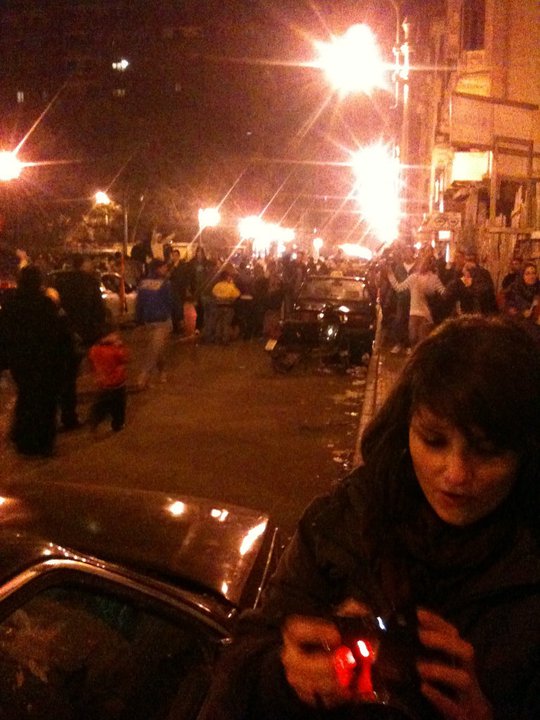Revolution@1: Foreigners without an agenda
State-sponsored conspiracy theories have been bad for foreigners in Egypt. But Egyptians must not succumb to xenophobia and must be open to the world.
Thursday 26 January 2012
I was only three years old when the Berlin Wall fell and my country, Bulgaria, started on the road to democracy. I don't remember much of the totalitarian regime that ruled for 50 years, other than the small red uniform that I had to wear to kindergarten. My parents have made sure that I know what they had to live through. They told me stories of fear, humiliation, and disgust. As much I sympathised with them, I could never fully understand what they felt for the first thirty years of their lives.
Then I came to Egypt, first as a student and then as a journalist. I could see the similarities between Hosni Mubarak's regime and the communist dictatorship that ruled Bulgaria. I heard stories from Egyptians, read about torture, saw people emigrate because they couldn't take it anymore, but I still didn't fully understand their pain. The worst that used to happen to me was my taxi would get stopped at night by the traffic police at the entrance to Maadi and my having to show my “white” face through the window to get them to expedite the check. Being “white” in Egypt allowed many of the expats to pay little attention to the suffering of their hosts. We were in such a position of privilege, getting treatment that most Egyptians never saw. I can't remember how many times I heard Egyptian friends tell me that they don't feel like citizens of their own country. “Egypt does not belong to the Egyptians,” they would say. And it was true. We, the “white” aliens, together with the Egyptian elite, hijacked the country. We had the kind of rights that the normal citizens should have enjoyed.
It came as a shock to many of us foreigners when state TV's rumours about us being behind the uprising succeeded in taking hold of the minds of many Egyptians and we started being targeted on the streets. At the time, I looked at this phenomenon as “the massive loss of clear thinking and normal reasoning” – those were the words I used in my blog entry on 4 February 2011. Now that I think about it, the wild xenophobia that lasted about four or five days was part of the catharsis of Egyptian people. They finally took us down from that pedestal of the untouchables that we had been sitting on.
For many of us, this was also a chance to get a taste of what billions of “non-white” people experience around the world – fear, persecution and injustice.
I wrote the above passage a week after my arrest by the military police on the day Hosni Mubarak fell (11 February 2011). The article never made it to print because my former Egyptian editor decided it was too dangerous to publish. Since then a lot has happened. What I thought was just four or five days of catharsis, turned out to be a year of chronic paranoia that some Egyptians have succumbed to. Without realising it, I myself have also fallen prey to the collective paranoia.
Every time at a Tahrir checkpoint, I would feel relieved to see the brow of the boy or girl from el-ligan el-sha'bia (the local, ad hoc security that popped up in the absence of the police) twist into a question mark at the sight of the Cyrillic characters in my passport. I would take photos sneakily, hoping no one would ask what I was doing. I would wear the same ragged jeans, worn-out shoes and jacket which I wore every day for the 18 days it took to topple Mubarak. I would almost definitely avoid being with Americans for too long at Tahrir. And just in case, I had prepared a short speech about “little Bulgaria” also suffering historically at the hands of the evil Western powers and having nothing to do with colonialism; oh, and by the way, we share common Ottoman heritage.
I was immensely happy three weeks ago to talk to an Egyptian in Bulgaria who was criticising the hell out of my country in a fancy Sofia restaurant. Ha! After Ahmed's tirade, I have all the right to sit in Costa and criticise the messy political situation in Egypt, I thought happily.
A bit later, I realised that I had lost all my senses, that I have also fallen victim to the infamous Egyptian state TV broadcasting conspiracy theories about foreign agents and agendas. It seems that I was desperately trying to convince myself that I am not a “a'meela” (foreign agent) and I don't have a secret agenda when I open my mouth to express an opinion about Egypt in front of an Egyptian.
Along with the regular flood of conspiracy theories and reports about apprehended spies of various nationalities broadcast on Egyptian TV, calls for the censorship of “foreign voices” have intensified and have come from the most unexpected places. Last month, al-Masry al-Youm's editor-in-chief Magdi el-Galad published quite a lengthy rant in which he attempted to justify the censorship of an opinion piece in the English edition of the paper, Egypt Independent. The article written by Robert Springborg talks about cleavages within the ranks of the Egyptian army, which el-Galad probably considered too dangerous for himself to publish. He chose to mask his spinelessness in fiery “patriotic” words about dying for the Egyptian nation and foiling Springborg's evil plot to hurt it, about snubbing the Pentagon, and yet forgetting to ask them to take back their $1.3 billion in annual military aid to the Egyptian army.
El-Gallad might be an obvious case, but Mona Abaza, a well-respected AUC professor, is not. A few months before the Egypt Independent affair, she wrote a piece published in al-Ahram and Jadaliyya in which she complains about Western academics flooding “local” Egyptian scholars with requests for assistance researching the Arab Spring. According to her, her Western colleagues come for just a week to visit the country and acquire the legitimacy of experts on the region. “Without sounding xenophobic,” Abaza says, trying to absolve herself of the xenophobia of her words, which do not distinguish between “some” and “all” Westerners.
There are plenty of mediocre Western journalists and scholars who not only do not understand the Middle East but also spread their faulty perceptions to readers in the West. However, there are also many who put a lot of effort into their research (without exploiting “locals”), who had been interested and lived in the region for a long time before the Arab Spring and have utmost respect for its cultures and peoplse. Elliot Colla, for example, who is an editor at Jadaliyya and who taught at my alma mater, is an excellent professor of comparative literature and a translator of Arabic literature. The Guardian has a staff of “Western” (non-local) correspondents in the Middle East such as Jack Shenker and Martin Chulov, who have done a great job covering events in the region. If el-Galad and Abaza were to give it honest consideration, they themselves could add quite a few additional examples.
I agree that Egyptians should tell their own story and I agree that the West should not meddle in the internal affairs of the country or try to set a direction for its transition. But it has to be recognised that the presence and the work of many foreigners on reporting and analysing what is happening in Egypt is of certain benefit to Egyptians. After all, international solidarity did play a role in Egypt's revolution, and if Egyptians can comment on and criticise Bulgaria and the West, surely the reverse also applies. Limiting, harassing or completely censoring “foreign” voices will not bring any good to the country.
Throughout its 20 years of transition from communism, Bulgaria has rarely received coverage in the Western media and even more rarely positive coverage, which, I admit, can be annoying. But I would rather see more criticism of my country that would move and shake its stagnant system than be happy with the status quo in which some Bulgarians congratulate themselves for not making it every day on to international front pages like bankrupt Greece does.
Happy first anniversary, revolutionary Egypt!
This article is part of a special Chronikler series to mark the first anniversary of the Egyptian revolution.


